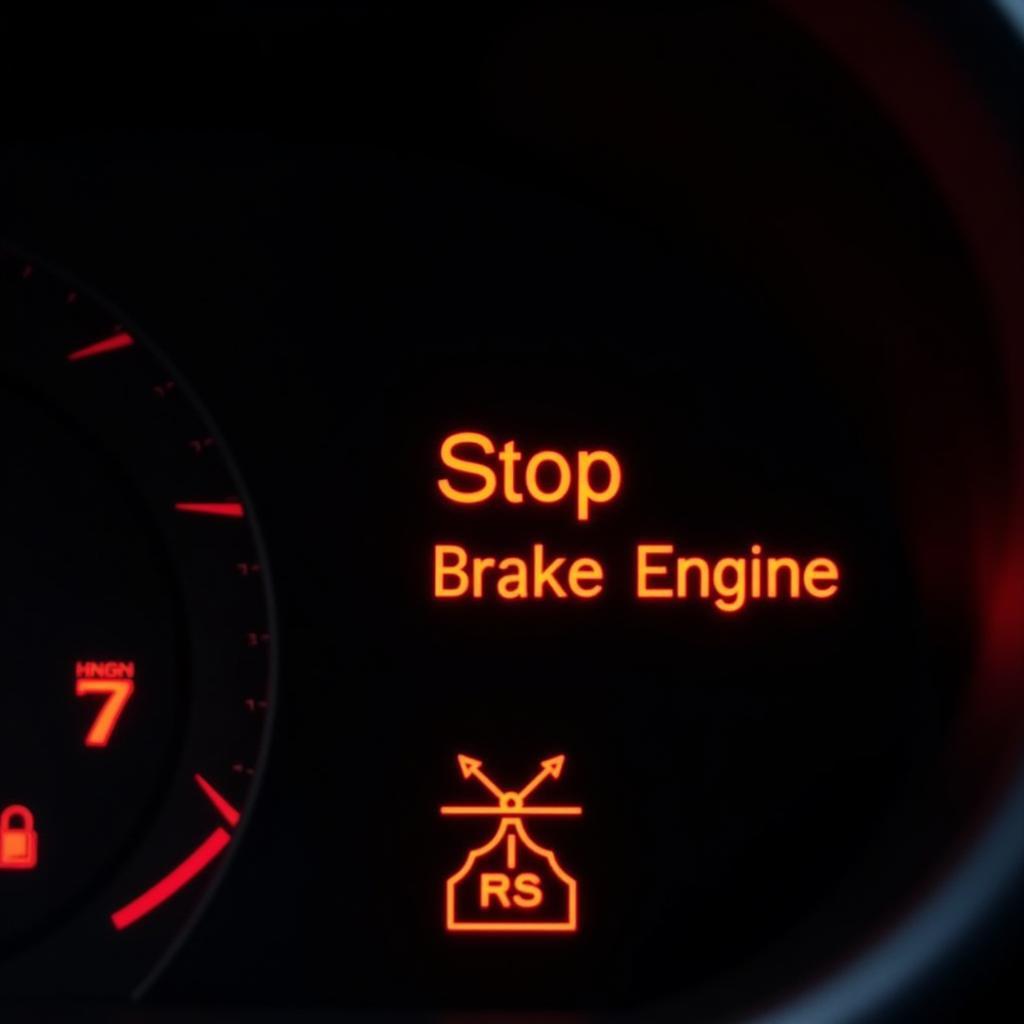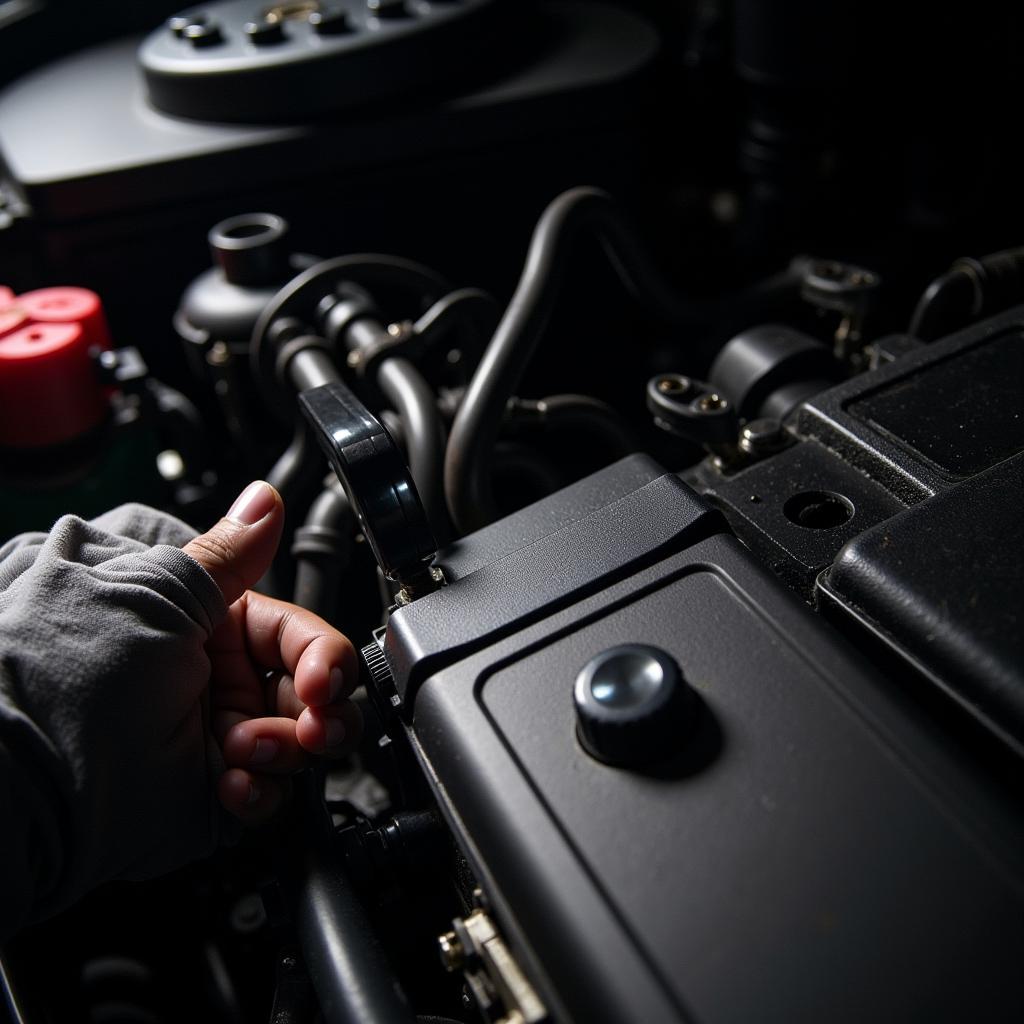Seeing a “Stop Brake Engine” warning light up on your Mercedes dashboard can be unsettling. While it sounds alarming, the good news is that this warning can often be resolved without a trip to the mechanic. This comprehensive guide will walk you through the common causes, troubleshooting steps, and potential solutions for the “Stop Brake Engine” warning on your Mercedes.
 Mercedes Stop Brake Engine Warning Light
Mercedes Stop Brake Engine Warning Light
Understanding the “Stop Brake Engine” Warning
The “Stop Brake Engine” warning in your Mercedes is a general alert system that can be triggered by various issues, ranging from minor glitches to more significant problems. This system is linked to several crucial components, including the braking system, engine control unit, and electronic stability program (ESP).
Common Causes of the “Stop Brake Engine” Warning
1. Brake Fluid Level
One of the most frequent culprits behind the “Stop Brake Engine” warning is low brake fluid. Brake fluid is vital for transmitting the force applied to the brake pedal, ensuring your Mercedes stops effectively.
What to do:
- Check the brake fluid level. Locate the brake fluid reservoir under the hood.
- Top up if necessary. If the fluid is low, carefully add the recommended brake fluid for your Mercedes model. Be sure to consult your owner’s manual for the correct type and procedure.
- Inspect for leaks. If you notice a consistently low brake fluid level, it could indicate a leak requiring immediate professional attention.
 Checking Brake Fluid Level in a Mercedes
Checking Brake Fluid Level in a Mercedes
2. Brake Pad Wear
Worn brake pads are another common reason for the warning. Mercedes vehicles often have brake pad wear sensors that trigger the warning light when the pads are nearing the end of their lifespan.
What to do:
- Inspect your brake pads. If you’re comfortable with basic car maintenance, you can visually check your brake pads for wear.
- Replace worn brake pads. If your brake pads are thin or you’re unsure about their condition, it’s best to have them inspected and replaced by a qualified mechanic.
3. Faulty Brake Light Switch
A malfunctioning brake light switch can also cause the “Stop Brake Engine” warning. This switch is responsible for activating your brake lights when you press the brake pedal.
What to do:
- Test your brake lights. Have someone observe your brake lights while you press the brake pedal. If they don’t illuminate, the brake light switch may be faulty.
- Replace the switch (if needed). Replacing a brake light switch is a relatively straightforward repair for a mechanic.
4. Malfunctioning Sensors
Modern Mercedes vehicles are equipped with numerous sensors that monitor various systems. A faulty sensor, such as a wheel speed sensor or steering angle sensor, can sometimes trigger the “Stop Brake Engine” warning.
What to do:
- Use a diagnostic scanner. A diagnostic scanner can read the error codes stored in your Mercedes’ computer, pinpointing the source of the problem.
- Seek professional help. If a faulty sensor is detected, it’s generally best to have it diagnosed and replaced by a qualified technician.
Remote Diagnostics and Software Solutions
In some cases, the “Stop Brake Engine” warning can be resolved remotely using specialized software. As an expert in automotive electrical engineering with a focus on remote diagnostics and software solutions, I often utilize advanced diagnostic tools to:
- Read and interpret fault codes. This allows me to pinpoint the root cause of the warning light.
- Perform software updates. Manufacturers regularly release software updates that can address glitches or bugs affecting vehicle systems.
- Reset the warning light. Once the underlying issue is resolved, the warning light can often be reset remotely.
“Remote diagnostics and software solutions can be incredibly effective in resolving these types of warnings,” says Mark Stevenson, a senior automotive electrical engineer specializing in Mercedes-Benz vehicles. “We can often diagnose and fix the issue without the car ever having to leave the owner’s driveway.”
When to Seek Professional Help
While some causes of the “Stop Brake Engine” warning are easily addressed, others require professional attention. If you’re unsure about any aspect of diagnosing or repairing your Mercedes, it’s crucial to consult a qualified mechanic.
Additionally, seek immediate professional help if you experience any of the following:
- The brake pedal feels spongy or unresponsive.
- You hear unusual noises (grinding, squealing) when braking.
- The vehicle pulls to one side when braking.
Conclusion
The “Stop Brake Engine” warning on your Mercedes is a sign that your vehicle needs attention. While it can be concerning, understanding the common causes and troubleshooting steps can help you address the issue promptly and safely. Remember, regular maintenance and prompt attention to warning signs are crucial for ensuring the optimal performance and safety of your Mercedes.
